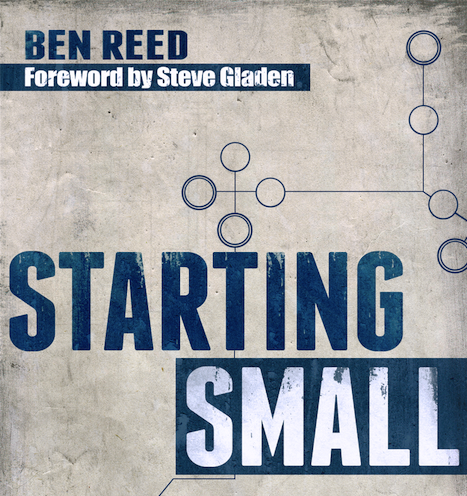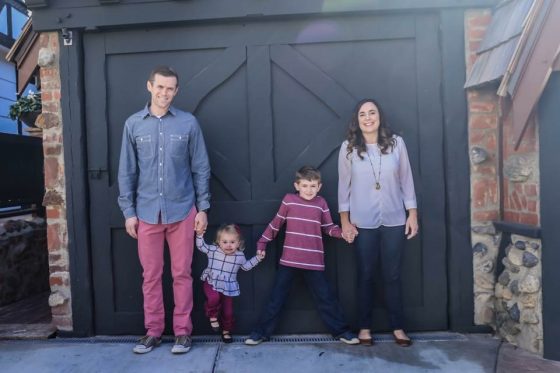This is an excerpt from my book, Starting Small: The Ultimate Small Group Blueprint. It’s more than an excerpt, too. It’s the entirety of chapter 2, my favorite chapter. This is the part of the book that I love the most, it was the easiest to write (because it was an overflow of so much of what I teach and live), and it’s the part I come back to most because it’s so foundational to everything I do.
My book’s on sale this week! Pick up a copy for yourself, or someone you’d like to invest in spiritually! Pick it up HERE.

Chapter 2
The Why before the What
“And let us consider how we may spur one another on toward love and good deeds, not giving up meeting together, as some are in the habit of doing, but encouraging one another—and all the more as you see the Day approaching.”
Hebrews 10:24-25
I don’t think it was ever stated, but growing up, I was made to believe that the Sunday morning worship experience was the most important aspect of my walk with Jesus—that if I missed a Sunday, I’d probably be struck by lightning. This was unintentional, for sure.
It’s just too easy for church leadership to slip into this mindset. Every Sunday morning is coming, whether you like it or not. So significant energy has to go into making sure Sunday happens. From sermon preparation to ensuring our worship team is going to be ready, from making sure the gathering room is clean to being sure we have offering buckets in the right spot to cones in the parking lot, it all has to be ready for the collective gathering of a larger group of people.
And without the Sunday morning experience, you won’t have an (gasp!) offering. So Sunday mornings have to happen. And they’re unbelievably important to our faith.
Without relational connection, the church isn’t the church. The church isn’t a building to be occupied by people once a week. You don’t believe that, and neither do I. The church is us, the people. We are the ones for whom Christ died. Not our buildings. Not our hymnals. Not our pews. It’s the people who are the church. And without relational connection, you don’t have a church.
At one level, my church experience growing up was good. I’m so thrilled that I grew up in a church that taught the gospel. My childhood church believed in the death, burial, and resurrection of Jesus. The people shared this message with others. But at another level, it didn’t work. My growth as a disciple happened outside of the scope of the normal way of doing life in my local church. My experience left me with more knowledge, but at the end of the day, the church was just a show. Not something that I actively participated in, but something I observed. I was a soaker—a sponge, entering the doors ready to be filled with water, rather than simultaneously emptying my sponge and soaking it back up.
It was after my junior year of high school that my spiritual life began to rocket forward. Every Friday night, a group of us guys would get together to study the Scriptures, pray together, actively engage in conversations about Jesus, hold one another accountable for our growth, and top it off with late-night runs to Waffle House. And occasionally throw rolls of toilet paper on the neighbor’s trees. Thankfully, I’ve grown since then. Kind of.
It was incredibly freeing and life-giving. At no other point in my spiritual life had my opinion been truly valued like with that group. At no other point had I been listened to rather than preached at. At no other point had I felt so closely connected relationally to people headed in the same direction as me. If it hadn’t been for that small group, I would in no way be who I am today.
We were living out Acts 2:42-46: “All the believers devoted themselves to the apostles’ teaching, and to fellowship, and to sharing in meals (including the Lord’s Supper), and to prayer. A deep sense of awe came over them all, and the apostles performed many miraculous signs and wonders. And all the believers met together in one place and shared everything they had. They sold their property and possessions and shared the money with those in need. They worshiped together at the Temple each day, met in homes for the Lord’s Supper, and shared their meals with great joy and generosity.”
For me, church never felt like Acts 2:42-26. Never. It was when I lived this out in the context of healthy relationships that I grew and became a disciple. Spiritual growth is so much more than information transfer.
If your church views spiritual growth as a process that happens simply through watching a show, it may not be Jesus followers that you’re creating. Without healthy relationships, you can’t fully honor God. Let’s look at some of the “one anothers” found in Scripture:
– Be devoted to one another. (Romans 12:10)
– Live in harmony with one another. (Romans 12:16)
– Love one another. (Romans 13:8)
– Be at peace with one another. (Mark 9:50)
– Wait for one another when you come together to eat. (1 Corinthians 11:33)
– Serve one another. (Galatians 5:13)
And it’s really hard to do this in a corporate worship setting. It’s really difficult to “be devoted” to someone else when you’re looking at the back of their heads and listening to someone else talk. It’s even more difficult to “serve one another” that way. Unless, of course, they need their hair brushed. Just the back part of it.
Without smaller communities, sitting in circles, not rows, it’s nearly impossible to obey God in all things. Don’t believe me? Then try this experiment. Read this verse, then I’ll toss an activity your way. “Bear one another’s burdens, and thereby fulfill the law of Christ.” (Galatians 6:2)
Now, this coming Sunday morning, I want you to try to bear someone else’s burdens. And if you have a small group that meets on Sunday morning, that doesn’t count. Try to “bear one another’s burdens” while your pastor is preaching. Or while you’re walking in to the service. Or while you’re singing. Or while you’re filling up your cup of coffee. Even though my “burden” may be a second cup of coffee, I’m not sure that is what Paul had in mind when he wrote to the churches at Galatia.
In fact, Paul is talking about overcoming something. Maybe it’s their sin. Maybe it’s the sin of someone else. But sharing someone’s burdens refers to helping walk someone back to the road of health and growth and grace. The burden of sin isn’t one we’re equipped to handle on our own. And to boil that down to “I’ll pray for you” is to weaken this command. It would be like filling someone’s coffee cup up with decaf. It takes the power right out of a good cup of coffee.
If you want to help people grow spiritually, get them doing life together. Not just getting together to watch a movie or hang out. Not just getting together to pray. Not just getting together to study the Bible. Not even just getting them together to serve. “Doing life together” encompasses so much more. How much more, you ask?
Let’s walk through an exercise. Name 10 sermons you’ve heard in your life that have shaped you.
10 life-changing sermons
Sermon Title Scripture References Significant Takeaway
1.
2.
3.
4.
5.
6.
7.
8.
9.
10.
I doubt you could name ten. I can remember just a couple of sermons that impacted me in life-altering ways. In the moment, I walk out of so many sermons thinking, “Wow! That was amazing!” but then I don’t apply the truth I’ve heard. Or I just simply forget it by the time my stomach growls for a Sunday afternoon lunch.
Now name 10 people that have invested in your life.
10 life-changing people
Name How you’re different because of them
1.
2.
3.
4.
5.
6.
7.
8.
9.
10.
Much easier, wasn’t it? It’s easier because people are much more memorable than ideas. And people help us contextualize truth, rather than keeping truth at an intellectual arms-length. When we sit in an auditorium and listen to a preacher proclaim truth, it’s easy to think, “I know someone who needs to hear this.” Or, “That’s a strong truth” without ever applying it.
Small groups are vital to the health of a local church. This reality is best understood when we put the why before the what. I love Sunday morning corporate worship. It energizes me to worship with other believers, and be challenged by good, solid preaching. But corporate gatherings alone will dry me up, spiritually. I need small group life. The times in my life when I was most alive spiritually have been the times when I was concurrently living life in honest, transparent community, not hiding behind a mask. Which is all-too-easy to do when you’re in a corporate setting. Hiding is much tougher when you’re living life with others.
1. It’s easy to hide in a large gathering. It’s tougher to hide in a small group. In fact, it’s nearly impossible. Which, let’s be honest, we’d prefer. Hiding is, at least in the short term, safer, easier, and a lot less messy. But for our spiritual growth, hiding is dangerous. And healing is found in confession with other like-minded believers.
2. It’s too easy to be passive during a sermon. Sermons are primarily about soaking in information. It’s a passive activity, for the most part. But we need to engage with the Scriptures while we engage with others. Good small groups don’t allow the passive person to remain that way. Healthy small groups are more intentional about engagement.
3. There is little to no accountability in corporate worship. If you, in your heart, commit to some area of obedience during a sermon, who is going to help you follow through with that? Our hearts are weak and our wills easily swayed, so we need others to walk alongside us. Follow-through is much easier in a small group than in a corporate setting, as we have people praying for our particular needs in smaller groups.
4. We’re prone to think we matter too little in corporate worship. In a room full of people, we are tempted to think that, in the big scheme of things, we really don’t matter. Unfortunately, we can fall into the trap of believing that our perspective, our gifts, our struggles, and our victories don’t carry much weight. Small groups remind us that we are loved, cared for, and bring culture-shaping gifts to the table that God intends to use.
5. We’re prone to think we matter too much in corporate worship. In a corporate setting, the other side of the coin is that we think our problems are the only ones that matter, that nobody really understands our struggles. Nobody could possibly know our pain. Nobody could remotely grasp our situation. Small groups remind us that others have problems like we do. .
6. We’re prone to think, “They need to hear this” in corporate worship. Don’t lie. You’ve thought that. You’ve heard a sermon and said, “Oh man, I sure wish _____ was here. She needs to hear this.” How arrogant are we when our only thought is how God could be speaking to someone else, instead of to us directly? Small groups challenge us to apply Truth personally. Small groups don’t let us get away with, “they need this.”
7. We’re prone to think, “This is only for me” in corporate worship. When we’re not thinking, “This is only for them,” we can easily think, “This is only for me.” We’re good at making the world revolve around us, especially when it comes to feeling sorry for ourselves. Small groups keep us from cycling into destructive self-pity and loathing. They help us think rightly about ourselves and God, reminding us that we’re only a part of the whole, and that other people are dealing with “life,” too. We’re told to “encourage one another daily” because our hearts are prone to being deceived by sin (Hebrews 3:13). We’ve got to have others to help us think rightly.
8. In a large gathering, when we cry, there’s nobody to ask us, “What’s going on?” If you cry in a large gathering/worship service, it’s easy for people to walk right by you, assuming someone else will stop and pray for you. But they don’t know your story. They don’t understand where the tears are coming from. They don’t know what they’d say. They don’t want to get too involved in your mess.
Small groups don’t allow tears to go unchecked. If you cry in a small group, everybody notices. And everybody cares. Tears become everyone’s problem, not just someone else’s. If you’re in pain, it becomes everyone’s problem, because everyone’s been praying for you, meeting with you, and growing with you. In other words, you have a relationship with them.
9. No food is allowed in most worship gatherings. There’s a sign outside of the worship center in the church building where I’m on staff that says, “No food or drink allowed.” Just because I “get it” doesn’t mean I have to like it. Thankfully, we eat well in our small group, which I’m convinced is a God-honoring activity. I can’t help but think of this key verse: “And day by day, attending the temple together and breaking bread in their homes, they received their food with glad and generous hearts” (Acts 2:46). Nothing helps a relationship form like a full belly.
10. “Be quiet while the pastor is preaching!” Small groups give you time to have deep, life-stirring conversations with people. Conversations that, if you tried to have them during a sermon in a worship service, people would look at you like you were crazy. They may even call security. And write blog posts about you.
Corporate worship services don’t lend themselves to discussions that help with understanding and application. Small groups ask hard questions and allow for discovery. Learning isn’t simply about transferring information. It’s about interacting with that information. Learning involves poking and prodding and finding the holes, then overlaying it on your life to see where and how things need to change.
11. Convictions can go unchecked in corporate worship. When the Spirit moves in small group, you’ve got time to slow down. But not so in a corporate worship service. When you’re convicted in a room full of people, it’s easy to slough it off, attributing it to the burrito you ate for dinner the night before.
In a small group, though, you have a chance to share those areas of your life that still need to grow. And you get to do it in a safe environment where people love you and have your best interests at heart. Then next week, they’re going to ask you about it. Not because they have to. But because they want to because they care.
12. It’s rare to pray for specific needs in a corporate worship setting. Small groups pray for the specific needs of their group members. Not just generic, “God, thank you for what you’re going to do here in this place” kind of prayers, but authentic pleading before God for others. Your needs are brought before God by others.
It’s life-giving when you hear others praying for you. When you hear others begging God to show up in your life: where you work, in your home, and in your relationships. Have you ever heard someone verbally pray for you, specifically? If so, then you know what it’s like to feel genuinely loved.
But small groups don’t do everything well. Setting realistic expectations is important, so that we don’t hope for something small groups can never give us.
One of the reasons that people get so frustrated with small group life is because they step in expecting something that small groups never promise to provide. Maybe they expect to get another sermon, like they did on Sunday morning. Maybe they expect to be constantly “fed.” Maybe they expect to have to do no work. Maybe they want a “deep” Bible study. Maybe they want a seminary classroom-style experience.
Those qualities that a small group does well are summed in 1 Thessalonians 5:14: “And we urge you, brothers, warn those who are idle, encourage the timid, help the weak, be patient with everyone.”
Using this verse, we can break down the important qualities of a healthy small group.
1. “Brothers:” Small groups help people “belong.” It is absolutely essential in our walks with Christ that we have brothers and sisters to whom we belong. This belonging is the foundation for the rest of the verse, and the foundation for living life in community as well.
We may prefer people to enter our churches who already believe, and have already begun to behave like good little Christians. But our culture today doesn’t value believing and behaving first. Our culture values belonging before they believe. They want to know they’re a part of something before they’ll fully believe in it.
“Church” isn’t merely a sermon factory. It isn’t merely a place that cranks out information for us to download, increasing our knowledge about God. It’s not just a place where church leaders tell people what to do and what not to do. It’s an opportunity to help people experience what being loved really means, despite pain and confusion and the junk of life. It is a chance to show love to people who have never been truly loved. Church is a place to give grace to those who have never experienced it. It’s a chance for us to worship God together, to pray together, and to serve together.
2. “Warn those who are idle:” We’re not talking about an “idol.” The word here is “idle.” We are to speak truth and hope into the lives of people who are stuck. Who can forget that living life as a Jesus follower is one of action. One of serving and loving and giving and going. Some of us need to quit planning and start doing.
Small groups are a breeding ground for personal ministry. When they’re running efficiently, then everybody contributes. Everybody has a role. And everybody feels valued because of the contribution they’re making.
Part of the responsibility of a small group leader is to help group members realize the work God’s called them to, as well as their unique contribution in the Kingdom. (Ephesians 4:12) One way this is accomplished is through turning people loose to use their gifts, rather than hoarding all of the responsibility of ministry. We’ll talk about this later, but for now, know that a vital responsibility of the group leader is not in doing everything necessary to help a group succeed. It’s in sharing the responsibilities necessary (hosting, facilitating, communication, scheduling, researching curriculum, finding and meeting needs), and in so doing, equipping people to exercise their ministry muscles.
3. “Encourage the timid:” Fear is a reality for us in many different seasons of life. It grips our hearts and keeps us in bondage. Fear is one of the key reasons why we need other people. We need others to encourage us to take steps of faith. We need to know that others have our backs when we might fail.
Our journey of faith is too difficult to do on our own. Much too difficult. And yet, we sometimes push back on the very encouragement we need. Strange and twisted, no? Sometimes, I just want to give up. My body’s tired and my mind is mush. I’d rather throw in the towel for the day. But when I press through, I find potential that I didn’t know existed. “When you feel like you’ve used every ounce of energy you possess, you’ve still got extra reserve you can draw on,” my coach once told me. Turns out he was right.
Encouragement communicates, “I believe in you,” and everyone needs to hear it. They need to know that someone else sees the same vision they do. Someone else believes they can close that gap. Someone else believes they can produce more, and become the better version of themselves that God intended. Those you lead can’t continue to do what God’s called them to do without a timely word of encouragement. Genuine encouragement is a gift you can give daily. Turns out it’s a biblical principle: “But encourage one another daily, as long as it is called ‘Today,’ so that none of you may be hardened by sin’s deceitfulness” (Hebrews 3:13).
4. “Help the weak:” When small groups rally around people in their group, or others in their community, there’s a deeper level of relationship than is found in most other areas of life. Helping the weak is something that healthy groups do well, especially when we realize that we can use our pain to help others.
The church that decentralizes pastoral care is a healthy church. Instead of viewing care as something that has to be done by the paid staff, these churches empower members to take on significant responsibilities. Pastoral care is best when it’s done by people who do life together, because there’s a deep relationship involved.
5. “Be patient with everyone:” We’re all at different points in our spiritual journeys. And at various points, each of us can be a difficult person. Whether we’re walking through a mess ourselves, helping others deal with a mess, or trying to figure out what God’s got next for us, we need others to be patient with us . . . and we need to learn to be patient with others. Just like God’s patient with us. It’s impossible to practice patience on your own. Being that we’re all broken sinners, small groups give us a great chance to exercise patience with one another.
Notice one key component of all of these biblical commands: They involve being active. None of these commands can be accomplished while you’re passive. None can be accomplished if you just look at group life as a sponge, expecting that following Jesus is about sitting around. If you go to a small group expecting to sit and soak, then you will dry up. If you go expecting to give deeply of yourself, then you will be filled.
This active nature of small groups is one of the most important reasons why small groups are critical to the health of every local church. Let me illustrate this point with a story. I played city-league basketball growing up. I wasn’t that great. I was a scrawny white kid. But I was quick, and a decent shooter.
We played games on Saturday mornings at a local elementary school gymnasium. Overall, it wasn’t a bad place to play. Plenty of seating. It was heated and cooled. And generally, it was clean. Generally.
Taking a look at the gym floor, you’d assume everything was fine. You could tell it had been used by decades of kids playing ball. The freshly veneered surface wasn’t new, but it was acceptable. But there was a spot.
And if you were to take me to that gym today, I could close my eyes and walk to the spot. It was about 6 feet out from the basket on the side closest to the door. It was dead. Everybody playing knew the spot was there, but in the heat of a game, usually once or twice, the guy with the ball would forget about the spot, and go up for a layup with nothing in their hands. Running down the court at full speed, the ball that was once bouncing right back to the hand would bound no more, falling like a bowling ball to the gym floor and making the player look like a fool.
If only the maintenance crew had peeled back the hardwood and exposed the subfloor, it would’ve been a problem easily remedied. It wouldn’t have cost a ton of money to fix the problem. But instead of fixing the underlying issue, maintenance decided to paint right over the spot and pretend it wasn’t there. Just below the surface was this ugly hole, hidden by a freshly painted, freshly lacquered surface.
We do the same things spiritually, don’t we? We put on beautiful masks to cover over a dark part of our story. We put a fresh coat of paint over the pain to tell the world we’re perfectly fine. We slather on fresh lacquer and cover up something that we’d rather others not know is there.
We forget that God can repair and restore what’s broken. We forget that God’s in the active business of reconciling all things to Himself. And though that reconciliation might not look like we hope it will look, in time we’ll grow to see the beauty. We’ll experience God’s love, forgiveness, and grace. We’ll become new.
It’s in this active process of restoring you and giving you hope that God will breath hope into someone else, too. But not if you paint over your issues. Instead of healing, you’ll cover over rotting wood. You will let the time bomb tick, while it’s waiting to explode in the heat of battle. When you need the foundation of your life to hold the strongest, you’ll find it crumbling as you live life in hiding.
You’ve got plenty of mess and pain and disappointments and frustrations. You have plenty of unmet expectations, unmet desires, and unreached potentials. So do I. Quit acting like you don’t have problems. We’re born without a mask. So let’s quit putting a mask on. Be real and honest with someone. I’ll start: I deal with insecurity. Not every day, but I have to battle against my flesh and remind myself that I’m loved by the King of Kings. I care too much what people think and what they say. “Sticks and stones may break my bones, but words can never hurt me” doesn’t ring true with me. Names hurt. Words injure. And I battle with caring too much how others respond to my leadership.
Why small groups? Because this level of authenticity just doesn’t happen in corporate gatherings. It takes intentionality and significant relationships. It takes meeting together regularly. It takes an active, not a passive, faith.
Get after it. Be active in a small group.
Questions:
What do you want your small group to look like? How many people? What will you study?
What will the goal of your small group be? Paint a picture of the person you want to produce.
Who will you invite to be a part of your small group? Have you prayed for them? If not, stop what you’re doing. And go pray.












